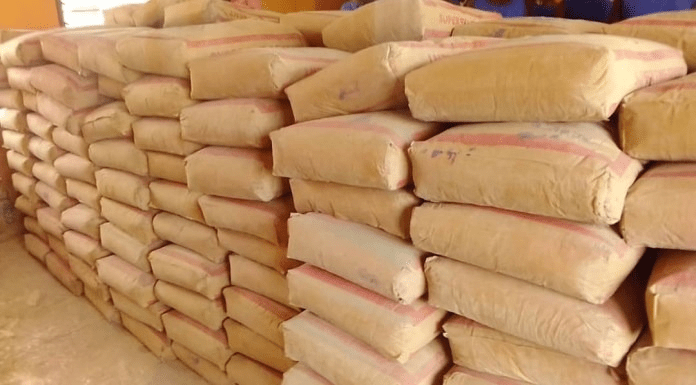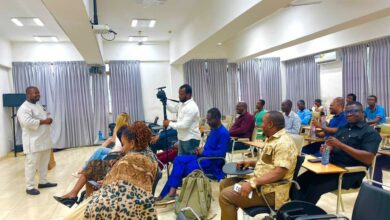Cement prices: We need administrative control, not legislative – Alan

Independent Presidential candidate and Leader of the Movement for Change, Alan Kyerematen says that the government must meet stakeholders in the cement industry and agree on how to control the rising prices rather than introducing legislation.
The former Trade Minister explained that because of the importation of clinker for the production of cement, whenever the Cedi falls against the Dollar, it automatically affects the prices of the commodity.
Asked for his view on the introduction of the Legislative Instrument (L.I) by Trade Minister KT Hammond to control the prices of Cement, while speaking on the New Day show on TV3 Monday, July 1, he said “It has a multiplying effect on the economy when prices of cement and petroleum products go up, it ought not always to be the case but sometimes that shows how our economy is structured. Anytime you have an imported product, and cement has about 85 to 90% imported raw materials which is the clinker and the Cedi depreciates it has an effect on the cost.
“If you solve the fundamental problem you don’t need to control prices. That can easily be resolved. When you legislate pricing then you are also affecting the market structure because we have opted for a field market operation.”
He added “At this point, we need administrative control rather than legislative control…you need to meet the industry and other stakeholders and agree, rather than introduce a legislation.”
A lot of analysts have expressed divergent views on the move to control the prices of cement with a legislative instrument.
For instance, Private legal practitioner Martin Kpebu asked the Trade Minister to meet and dialogue with producers of cement on the need to reduce their prices.
To him, dialogue is the best approach to achieve the objective of getting the prices reduced, not a law that will prosecute the producers.
Drawing lessons from Covid-19 era when prosecution for offenses of the Covid law came to an end after a few incarcerations, this L.I, if approved, will not yield any result in terms of prosecution.
“I have some sympathy for KT Hammond except that he is alone wolf, these are powerful businesses and they have several ways to fight you.
“They can go and sponsor your party and get you removed, these are big businesses. I am for a policy that will bring down the prices of goods and services. If it is possible to dialogue for prices to come down I am for it but if KT Hammond can step back, reorganize and engage them to do things in a manner that will bring it down we are for it,” he said on the Key Points on TV3 Saturday June 29.
Also commenting on the same issue, a professor at the University of Ghana, Ransford Gyampo has observed that some people are arbitrarily increasing prices and are hiding under the cloak of economic difficulties.
He described such persons as unpatriotic people milking Ghanaians.
“We can’t allow unpatriotic people to continue that bogus claim of ‘are you not in Ghana’ to be inflicting hardships on Ghanaians let us not blame the politicians alone, sometimes we must blame ourselves,” he also said on the Key Points on TV3 Saturday, June 29.
He stressed “People hide under the difficulty of the current situation to unnecessarily look for profit and that should be worrying to Ghanaians, that is unfair and unpatriotic.
“If the Cedi is depreciating and it must have an impact on the prices so be it but they should not hide behind the Cedi fall and hike prices
“We should have a certain price control mechanism to control unpatriotic people but in doing so we shouldn’t have KT Hammond to lead the charge such a major policy you don’t engage.
“I admit that some are taking undue advantage of the situation. I favour some price control to ensure unpatriotic Ghanaians milk Ghanaians dry using the hardship for the Cedi to arbitrarily increase prices but it should come about as a result of some dialogue.”
For his part, the Executive Secretary of the Cement Manufacturers Association of Ghana (CMAG) Rev. Dr. George Dawson-Ahmoah said that unfavorable economic conditions in Ghana are causing them to increase prices of cement.
He stated that no cement producer is happy with increasing prices.
“No cement manufacturer is happy with increasing prices. we do that because of an unfavorable economic situation,” he said on the Key Points on TV3 on Saturday, June 29.
Rev. Dr. George Dawson-Ahmoah said on the Key Points on TV3 Saturday, June 29 that the rapid depreciation of the local currency has been impacting their operations, forcing them to raise the prices of cement.
Clinker which is a major component of cement production, is imported hence the depreciation of the Cedi’s impact on their business, he said.
“It has a huge impact on the pricing of cement. There are other factors but currently this is a major concern now and that is what has motivated the Minister to rush to parliament to regulate prices. Why didn’t he do it last year?” He said.
Rev. Dr. George Dawson-Ahmoah had told Trade Minister K T Hammond that the increasing prices of cement can be attributed to the fall of the Cedi against the Dollar.
Rev Dawson-Ahmoah said they do not need a Legislative Instrument to regulate cement prices.
Rev. Dr. George Dawson-Ahmoah further stated that they have not been consulted on the L.I. He asked the Minister to seek their views on it.
“Why is the Minister avoiding or just running away from this discussion? Previously, our position has been that these prices of cement, the increase of prices of cement, it is not done in a vacuum. It is not done just because we wake up in the morning and do it,” he said.
“It is as a result of a negative trend in the economy, which is warranting such increases, and that is the issue. And like I said, what is happening now with cement prices is just because of the rapid and consistent depreciation of the cedi against the foreign currencies.
“We don’t know anything about it. And with my common knowledge in legislative instruments, don’t you involve stakeholders before it gets to Parliament? Don’t you involve stakeholders in the process?” he quizzed on Tuesday.
But KT Hammond told journalists in Parliament on Wednesday, June 26 that he had engaged them.
“I asked them to ensure that something was done about it. In my absence, I was told that the minister wasn’t going to be able to do anything.
“They would not listen, they wouldn’t do it, and they would go the way they want. “Encouraging them to do it is a moral persuasion. If moral persuasion fails, there is a system in the country, there’s a constitution, and we are preyed by a rule of law. If we don’t accept the moral principle, at least some sort of economic principle, the good people of Ghana must benefit. I don’t think it is fair for the way they are pricing and the way, haphazardly each one of them decides and dictates how much a bag of cement should be sold for.
“This is quite apart from the quality that they are producing. Some of the companies are producing substandard products. We have had to deal with this matter,” he said.
An attempt to lay the document in Parliament on Tuesday, June 26, was blocked by the Minority.
The opposition lawmakers insisted the L.I. must first be discussed.






